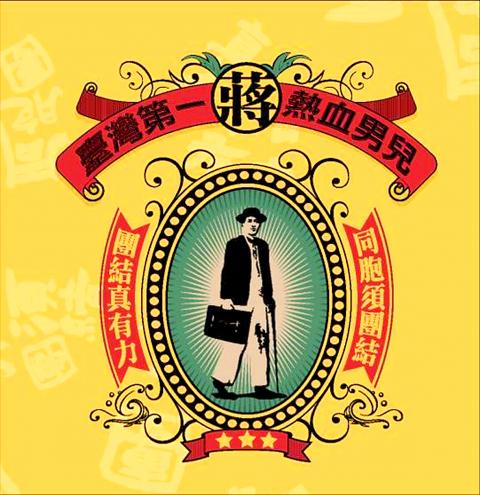Taiwanese democracy pioneer Chiang Wei-shui’s (蔣渭水) ashes are to be reinterred in his native Yilan County on Oct. 17, with an exhibition and a two-day concert to honor his life, the Yilan County Government said.
Born in Yilan in 1891, Chiang was an anti-colonialist who fought Japanese rule and the founder of the Taiwanese Cultural Association, Taiwanese Workers’ League, Taiwanese People’s Party and the Taiwan Minpao newspaper. Chiang, who died in 1931 in Taipei, is considered the first significant leader to promote Taiwanese culture and autonomy.
A motorcade is to take Chiang’s ashes from Taipei’s Liuzhangli Public Cemetery to Yilan’s Cherry Blossom Cemetery, Yilan County Civil Affairs Department Director Shao Chih-chi (邵治綺) said.

Photo courtesy of Yilan County Government
Shao said the county government renamed a hill at Cherry Blossom Cemetery “Wei-shui Hill” (渭水之丘) to commemorate “a man of action who moved forward ceaselessly.”
This was also the inspiration for the design for the event’s logo: “Chiang Wei-shui, the Walker.”
Artist Wen Hsiao-mei (溫曉梅) was invited to create the Chiang Wei-shui Exhibition: Images and Installations, Shao said.
The exhibition’s visual motif of an “open window” signifies how Chiang opened vistas to the future for Taiwanese, she said, adding that the show is to open on Thursday in Yilan City’s Dioudioudang Forest Park Square (丟丟噹森林廣場). The funeral procession is to stop at seven Yilan City historic sites associated with Chiang, including his residence, Wenchang Temple (文昌廟), Chaoyin Temple (昭應宮) and the Temple of the City God (城隍廟), she said.
Concerts are to be held on Oct. 17 and Oct. 18, featuring musicians known for social activism, she said. Performers on the first day include Jacky Chen (陳建瑋), Chen Ming-chang (陳明章), Lin Sheng-xiang (林生祥), Ilid Kaolo and punk group Fire Ex (滅火器), while the Village Armed Youth (農村武裝青年), Hakka hip-hop artist Kou Chou Ching (拷秋勤) and the Taipei Chinese Orchestra perform on the second day, she said.

A magnitude 4.9 earthquake struck off Tainan at 11:47am today, the Central Weather Administration (CWA) said. The hypocenter was 32.3km northeast of Tainan City Hall at a depth of 7.3km, CWA data showed. The intensity of the quake, which gauges the actual effect of a seismic event, measured 4 in Tainan and Chiayi County on Taiwan's seven-tier intensity scale, the data showed. The quake had an intensity of 3 in Chiayi City and County, and Yunlin County, while it was measured as 2 in Kaohsiung, Nantou County, Changhua County, Taitung County and offshore Penghu County, the data showed. There were no immediate reports of

‘DENIAL DEFENSE’: The US would increase its military presence with uncrewed ships, and submarines, while boosting defense in the Indo-Pacific, a Pete Hegseth memo said The US is reorienting its military strategy to focus primarily on deterring a potential Chinese invasion of Taiwan, a memo signed by US Secretary of Defense Pete Hegseth showed. The memo also called on Taiwan to increase its defense spending. The document, known as the “Interim National Defense Strategic Guidance,” was distributed this month and detailed the national defense plans of US President Donald Trump’s administration, an article in the Washington Post said on Saturday. It outlines how the US can prepare for a potential war with China and defend itself from threats in the “near abroad,” including Greenland and the Panama

The Chinese Nationalist Party (KMT) is maintaining close ties with Beijing, the Democratic Progressive Party (DPP) said yesterday, hours after a new round of Chinese military drills in the Taiwan Strait began. Political parties in a democracy have a responsibility to be loyal to the nation and defend its sovereignty, DPP spokesman Justin Wu (吳崢) told a news conference in Taipei. His comments came hours after Beijing announced via Chinese state media that the Chinese People’s Liberation Army’s Eastern Theater Command was holding large-scale drills simulating a multi-pronged attack on Taiwan. Contrary to the KMT’s claims that it is staunchly anti-communist, KMT Deputy

RESPONSE: The government would investigate incidents of Taiwanese entertainers in China promoting CCP propaganda online in contravention of the law, the source said Taiwanese entertainers living in China who are found to have contravened cross-strait regulations or collaborated with the Chinese Communist Party (CCP) could be subject to fines, a source said on Sunday. Several Taiwanese entertainers have posted on the social media platform Sina Weibo saying that Taiwan “must be returned” to China, and sharing news articles from Chinese state media. In response, the Mainland Affairs Council (MAC) has asked the Ministry of Culture to investigate whether the entertainers had contravened any laws, and asked for them to be questioned upon their return to Taiwan, an official familiar with the matter said. To curb repeated